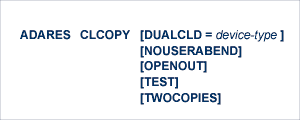The CLCOPY function is used only if dual logging of command information was specified for the Adabas session. This function copies the data set that has the earlier time stamp to a sequential data set. Once the CLCOPY function is completed successfully, the copied data set is marked as empty. This function may, therefore, be used only once for any given data set.
Once the ADARES CLCOPY job has run for a CLOG data set, the ADARES utility checks the PPT to determine whether any additional CLOG data sets need to be copied. If so, it invokes user exit 2 or user exit 12, as appropriate, to accommodate the number of data sets that need copying. For example, if NCLOG=8, once the initial CLCOPY job completes, the ADARES utility will issue a call to the nucleus to invoke user exit 2 or 12 for each uncopied CLOG data set it detects.
The CLCOPY function is not allowed in single-user mode.

This document covers the following topics:
ADARES CLCOPY can be specified with no parameters.
DUALCLD specifies the device type used for the dual command log data sets. This parameter is required if the device type used for the command log data set is different from that specified with the ADARUN DEVICE parameter.
When a parameter error or a functional error occurs while this utility function is running, the utility ordinarily prints an error message and terminates with user abend 34 (with a dump) or user abend 35 (without a dump). If NOUSERABEND is specified, the utility will not abend after printing the error message. Instead, the message "utility TERMINATED DUE TO ERROR CONDITION" is displayed and the utility terminates with condition code 20.
Note:
When NOUSERABEND is specified, we recommend that it be specified
as the first parameter of the utility function (before all other parameters).
This is necessary to ensure that its parameter error processing occurs
properly.
The OPENOUT parameter indicates that the DD/SIAUS1/2 output data sets are to be opened by ADARES, even if no data is actually to be copied. Without OPENOUT, the sequential output data sets are not opened if ADARES detects an end-of-file condition while attempting to read the first input record; this may cause problems in some operating system environments. With OPENOUT, the output data sets are opened before the first input record is read.
The TEST parameter tests the operation syntax without actually performing the operation. Only the syntax of the specified parameters can be tested; not the validity of values and variables.
TWOCOPIES causes two copies of the output to be created.
ADARES CLCOPY
Dual command log is to be copied.
ADARES CLCOPY TWOCOPIES
Dual command log is to be copied. Two copies of the output are to be created.